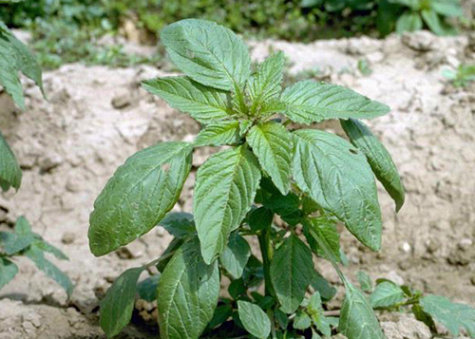Pigweeds

This weed can be a major nuisance for gardeners, homeowners and farmers alike. There are many different types of pigweeds that can be found in the garden however all of them are summer annual weeds that emerge from April through October in Kansas. All pigweeds are from the genus Amaranthus which also has several ornamental plants as well. The most common pigweeds to find in the garden include red root pigweed, smooth pigweed, and spiny pigweed however there are other varieties as well. These weeds are native to the desert southwest portion of the United States and thrives in warm conditions with optimal temperatures for growth ranging from 96 to 120 degrees Fahrenheit.
Some of the biggest issues with pigweeds is they grow far faster than our vegetables or flowers with up to 1” of growth per day and they are prolific seed producers with some large plants capable of producing up to one million seeds a year. Pigweeds are commonly resistant to herbicides in part because the large number of seeds they produce leads to genetic mutations causing herbicide resistance. Luckily the seed is only viable in the soil for a few years unlike other weeds.
There are several ways to control pigweeds in your garden or lawn, the first is a pre-emergent herbicide in the spring before the seeds germinate. Be sure to read the label to check if it lists pigweeds as one of the weeds it controls. In a garden setting mulch is an excellent preventative tool as the seeds need sunlight to germinate which is blocked by the mulch. If the weeds have germinated and started to come up there are two options, the first is to remove all the weeds either by hand or using mechanical means. The final option is to use post-emergent herbicides such as glyphosphate, 2,4-D or a product with a combination of active ingredients.

Have questions? Contact our office where our Horticulture Extension Agent will assist you with questions.
Phone: (316) 321-9660
Email: callae@ksu.edu